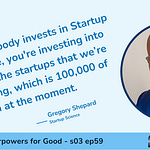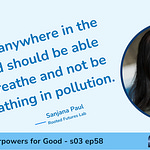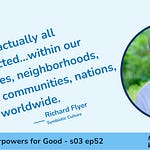Remember, you can watch the Superpowers for Good show on e360tv. To watch the episode, download the #e360tv channel app to your streaming device–Roku, AppleTV or AmazonFireTV–or your mobile device. You can even watch it on the web.
Devin: What is your superpower?
Gordon: My superpower is a built-in desire to help, a built-in desire to do good in the world.
Rotary International President Gordon McInally is using his one-year term at the helm of the global service organization to advocate for mental health programs. While there are zero countries on the globe with no mental health problems, there are a few with virtually no programs to support those who struggle.
Rotary has over 40,000 clubs in about 200 countries around the world. “We're in more countries than McDonald's,” Gordon says, without noting that the organization has more chapters than McDonald’s has restaurants.
During his one-year tenure, Gordon will spend much of his time traveling. He’ll visit many more countries during his tenure than a typical president of the United States visits during a four-year term.
“The work of Rotary is not done in my office in Evanston, just outside of Chicago,” he says. “The work of Rotary is done in each and every one of the 46,000 clubs around the world. So, it's so important for me to get out and meet these people and be able to say ‘thank you’ to them, ‘thank you’ for what they're doing. Thank them for everything that they've done in the past and everything that they'll be doing in the future.”
All Rotary presidents have some latitude to set something of an agenda, formally creating themes and mottos for their year of leadership. Gordon’s passion for mental health is unusual, not in the nature of his focus, but in his commitment to it. When we scheduled the interview, the staff made clear we couldn’t conduct the interview if mental health weren’t a topic. I eagerly agreed.
He shared some examples of the mental health initiatives Rotary is undertaking:
One is in India. I was in India before I took office. I was in India in April and saw a wonderful project there called Wellness in a Box. Essentially, that is a program that's delivered to 12-year-olds and over in schools in Nagpur, India. It's giving these children coping skills with anxiety and depression symptoms. It's teaching them how it's important to open up and share about things.
It's teaching them to be aware of the trigger signs that may lead to more serious mental illness. It's also training the teachers of these children to be able to spot the signs and to be able to help seek intervention where intervention might be necessary. So, it's a wonderful project that is replicable, and we're seeing it being rolled out in other countries as well, in Nigeria and Puerto Rico and also in the US, in Florida, in New Zealand.
There's a wonderful project, again, working with young people, recognizing that young people are often the most challenged. Working with young people who are being given skills and cognitive behavioral therapy and being helped to improve things and recognize where they're headed and hopefully intervene before things become too serious.
In Colorado, here in the US, we have seen a group of Rotary clubs establish a scholarship for a psychologist to study, and this will then increase the capacity for intervention from a psychologist in the future.
So everywhere you go, you're seeing an interest in addressing the issue. Everywhere I go, I'm hearing people tell me about personal experiences that have led them to want to support this issue as well.
Mental health is a global issue exacerbated by COVID. With Gordon’s leadership on this challenge, I believe lives will be changed, and some lives will be saved.
Gordon deploys his superpower enthusiastically in this role. His great strength is a built-in desire to help.
AI Episode Summary
Devin Thorpe interviews Gordon McInally, the President of Rotary International, on the Superpowers for Good show.
McInally shares his passion for mental health and how Rotary has been quietly working on mental wellness for years.
He highlights the challenges that have arisen from the Covid-19 pandemic, especially for young people.
McInally discusses the importance of addressing mental health, which is often treated as a taboo subject.
He mentions Rotary's flagship project, the Global Eradication of Polio campaign, and the progress they have made in reducing polio cases worldwide.
McInally talks about his role as President of Rotary International and the privilege of meeting Rotarians around the world.
He emphasizes the importance of collaboration and partnerships in Rotary's work.
McInally shares specific examples of Rotary projects focused on mental health, including initiatives in India and Zambia.
He reflects on his personal experience with Rotary's impact, particularly in helping orphaned children in Rwanda find hope and build better lives.
McInally encourages individuals to activate their desire to help by joining Rotary and participating in acts of kindness.
How to Develop a Built-in Desire to Help As a Superpower
As the president of a global service organization, it is fitting that Gordon would have a built-in desire to help as his superpower. He shared an example of how he’s deployed that with Rotary in the past:
I want to take you back to the mid-1990s when Rwanda, a small country in central Africa, underwent a genocide that saw up to a million people killed in the space of 100 days. A whole generation was ripped out of that country, and there was a whole generation of young children who were left as orphans of that genocide and were at rock bottom. They had no hope for the future.
Rotary got involved, and I was spearheading a project out of Rotary in Britain and Ireland to help in partnership with an organization called Hope and Homes for Children to work on a project to help these orphans of the Rwandan genocide.
I remember going out to scope out the project the first time, which was probably about 2000, maybe 2001, or 2002. I remember going to a village and meeting a young girl and her brother–Claudette and Francoise. Claudette was 16, Francoise was about 10, and they had been orphaned by the genocide of 1994.
Their father had been killed in the Civil War, and their mother had been sexually assaulted by the soldiers, contracted AIDS, and she had subsequently died. These two young kids had absolutely nothing. They were living in a hovel. You could hardly call it a home. They were living in a hovel. They just had no future whatsoever.
They were taken under the wing of the project that we called Rotary's Africa Hope. Over the ensuing years, they got back into education. They had the opportunity to get a new, secure home. Even today, we still hear from them. They've gone on to do well.
Gordon offered a critical tip for developing your own desire to help, noting the inherent benefits that result. “The first thing I would say, and this is recognized and borne out by university studies, is that one of the best ways to feel good about yourself, one of the best ways to improve your own sense of worth, your own well-being, is to perform acts of kindness.”
He adds enthusiastically that joining a Rotary Club is a great way to find opportunities to help.
By following Gordon’s example and advice, you can make a built-in desire to help a strength. With practice, you could make it a superpower that enables you to do more good in the world.
Guest Profile
Gordon McInally (he/him):
President, Rotary International
About Rotary International: Rotary brings together a global network of volunteer leaders dedicated to tackling the world’s most pressing humanitarian challenges. Rotary connects 1.4 million members of more than 46,000 Rotary clubs in almost every country in the world. Their work improves lives at both the local and international levels, from helping families in need in their own communities to working toward a polio-free world.
Website: www.rotary.org
Twitter Handle: @Rotary
Company Facebook Page: facebook.com/rotary/
Linkedin: linkedin.com/company/rotary-international/
Instagram Handle: @rotaryinternational
Biographical Information: R. Gordon R. McInally is president of Rotary International. He was educated at the Royal High School in Edinburgh and at the University of Dundee, where he earned his graduate degree in dental surgery. He operated his own dental practice in Edinburgh until 2016. Gordon was chair of the East of Scotland branch of the British Paedodontic Society and has held various academic positions. He has also served as a presbytery elder, chair of the Queensferry parish congregational board, and commissioner to the general assembly of the Church of Scotland.
Twitter Handle: @gordonmcinally
Personal Facebook Profile: facebook.com/rgr.mcinally/
















